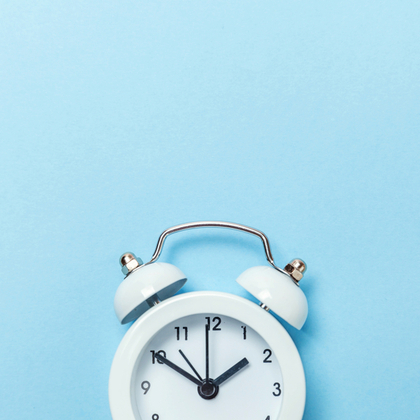
We often regard sleep as the third pillar of health together with diet and exercise. However, the truth is sleep is the foundation on which these two pillars sit. It’s a biological necessity and the elixir of life.
Many of us will miss an hour of sleep now and again – perhaps due to working late, socialising, or travelling between time zones. But sleep debt – or incremental sleep loss – becomes problematic when we start frequently under-sleeping.
Here, we take a look at recovering from sleep debt and, more importantly, how to prevent it in the first place.
What is sleep debt?
Sleep debt (also known as sleep deficit) is the mismatch between the amount of sleep you need and the amount you get.
For instance, if you got 30 minutes less sleep one night, you might think this negligible amount of sleep loss is fine. But sleep debt is cumulative, so going to bed 30 minutes later than usual for a few nights can quickly add up. And this can make a huge difference to your daily life.
Sleep debt is like compounding interest on a loan: it builds exponentially. That’s why getting regular sleep each night is so vital.
What are the effects of sleep debt?
Chronically under-sleeping can increase your risk of everyday difficulties and health complications. It can quickly affect your metabolism, immunity, and cardiovascular function, to name a few.
Sleep deprivation can even increase the risk of drowsy driving, which can jeopardise your life and the lives of others.
One of the most concerning aspects of sleep debt is that it doesn’t always correlate with intensified tiredness and fatigue. Studies report people can cognitively adapt to sleep loss, even though their body shows dramatic declines in mental and physical performance (1).
Can you repay sleep debt?
Unfortunately, sleep isn’t like the bank. You can’t pay off your debt at a later date. Napping and having a lie-in on weekends may improve energy levels to a certain extent, but they’re not enough to clear the accumulating effects of sleep debt.
Your body and brain rely on getting enough every night – without fail. Therefore, if you forgo rest – and the different stages that come with it – you can’t regain what you lost during that night.
One study reported that participants who reduced their sleep by five hours during the week but had more sleep at the weekend to account for it still experienced real health consequences (1). Findings revealed weekend recovery sleep doesn’t prevent metabolic dysregulation and potential weight gain linked to chronic sleep deprivation.
Is sleep damage permanent?
Astonishingly, research has also found that it can take four days to recuperate from one hour of lost sleep and up to nine days to eliminate sleep debt fully (2). So, whilst it takes time, your body can fully recover when you have consistently had a pattern of insufficient sleep for some time.
How to avoid sleep debt
Without proper sleep, you can’t be your best self. However, you can avoid sleep debt by prioritising rest.
Think about your lifestyle
If you’ve accumulated a lot of sleep debt, it might be worth assessing your daytime habits as they may contribute to sleep loss.
Drinking caffeine after midday, exercising intensely late in the evening, and using electronic devices when you should be unwinding for sleep may negatively affect your sleep.
Some sleep-supporting habits you may wish to incorporate into your daily life include getting enough morning light, eating your evening meal earlier, and managing stress.
You can read more about improving your sleep hygiene here.
Give yourself a sleep schedule
Make an effort to go to bed at the same time every night. This will ensure you give yourself enough time to achieve sufficient rest.
For instance, if you want to be asleep by 10.30 pm, you could set an alarm to start winding down at 9.45 pm. Even an extra 15-20 minutes of rest each night can benefit your health and cognitive function.
Create a night-time routine that works for you
Sleep is like landing a plane; you need time to descend. Consider choosing a few activities that will help you transition from day mode to night mode, such as gentle stretching, reading by a soft lamp, or diffusing essential oils.
Fine-tune your sleeping environment
Optimising your bedroom for sleep is equally important. Set the temperature to around 16-18 degrees, block out any noise and light, and choose comfortable bedding.
Consider your nutrition
Of course, eating in a way to support your sleep matters, too. Try to include more sources of the following nutrients.
Magnesium
Magnesium is involved in over 300 biochemical processes. It supports normal psychological and nervous system function, which is why it’s often recommended for sleep.
Whole grains, dark chocolate, nuts, and seeds are rich sources of magnesium. You can also take a high-strength magnesium supplement to support your intake.
B vitamins
Many B vitamins are involved in normal psychological function, including vitamins B1 and B12, and nervous system function – namely, vitamins B2, B3, B6, and B7 – all critical for sleep.
You can find these B vitamins in fish, poultry, meat, eggs, green leafy vegetables, beans, and peas. Still, you may want to consider a comprehensive B complex to cover any nutritional shortfalls.
PEA
PEA is an endocannabinoid-like compound naturally produced when cells are damaged or threatened. It's a well-researched alternative to CBD and is often recommended to support sleep.
Griffonia seed extract
Griffonia seed extract contains 5 HTP (5-Hydroxytryptophan), the natural compound the body produces from tryptophan, an amino acid. The brain converts 5 HTP into serotonin, a ‘feel-good’ neurotransmitter, which influences sleep.
Theanine and lemon balm (melissa)
Known for its soothing properties, l-theanine is an amino acid found in green and black tea. It’s often combined with the calming herb lemon balm (melissa) to support sleep hygiene.
Tart cherry juice
Tart cherry juice is rich in potent antioxidants called anthocyanidins and is a popular choice for sleep.
You can read more about tart cherry juice here.
Valerian
Valerian root is a traditional herb used for the temporary relief of sleep disturbances and mild anxiety.
Find out more
If you found this piece on sleep debt useful, you can find similar guidance on our dedicated Sleep Health Hub. Alternatively, please get in touch with our team of expert Nutrition Advisors, who are on hand to provide free, confidential advice via email, phone, and Live Chat.
*Subject to cookie consent
References:
-
The cumulative cost of additional wakefulness: Dose-response effects on neurobehavioral functions and sleep physiology from chronic sleep restriction and total sleep deprivation. Van Dongen, H. P., Maislin, G., Mullington, J. M., & Dinges, D. F. (2003). Sleep, 26(2), 117–126.
-
Ad libitum Weekend Recovery Sleep Fails to Prevent Metabolic Dysregulation during a Repeating Pattern of Insufficient Sleep and Weekend Recovery Sleep. Depner CM, Melanson EL, Eckel RH, Snell-Bergeon JK, Perreault L, Bergman BC, Higgins JA, Guerin MK, Stothard ER, Morton SJ, Wright KP Jr. (2019) Curr Biol. 29(6):957-967.e4.
Related Posts

Do I Have Symptoms Of Insomnia Or Just Trouble Sleeping?

Insomnia Treatments: Natural Remedies To Help You Fall Asleep

Why Am I Always Tired? Signs Of Poor Sleep Hygiene Explained

Olivia
Olivia Salter has always been an avid health nut. After graduating from the University of Bristol, she began working for a nutritional consultancy where she discovered her passion for all things wellness-related. There, she executed much of the company’s content marketing strategy and found her niche in health writing, publishing articles in Women’s Health, Mind Body Green, Thrive and Psychologies.
View More
